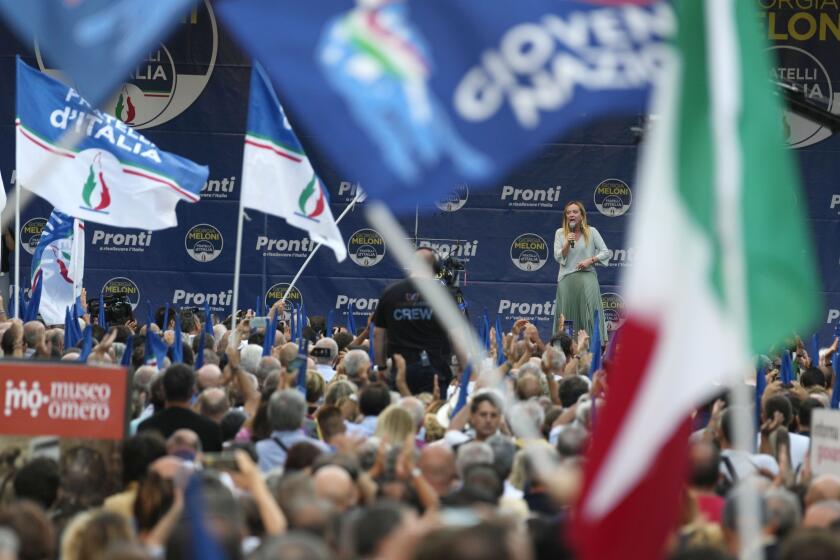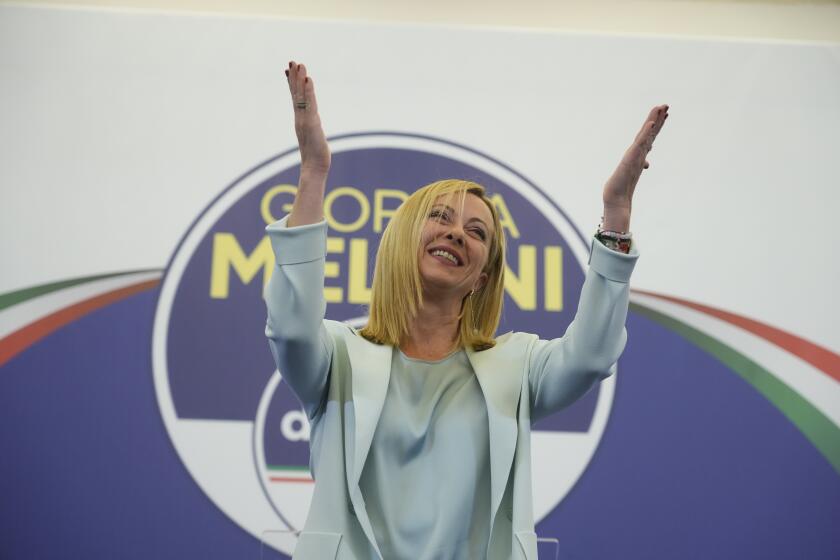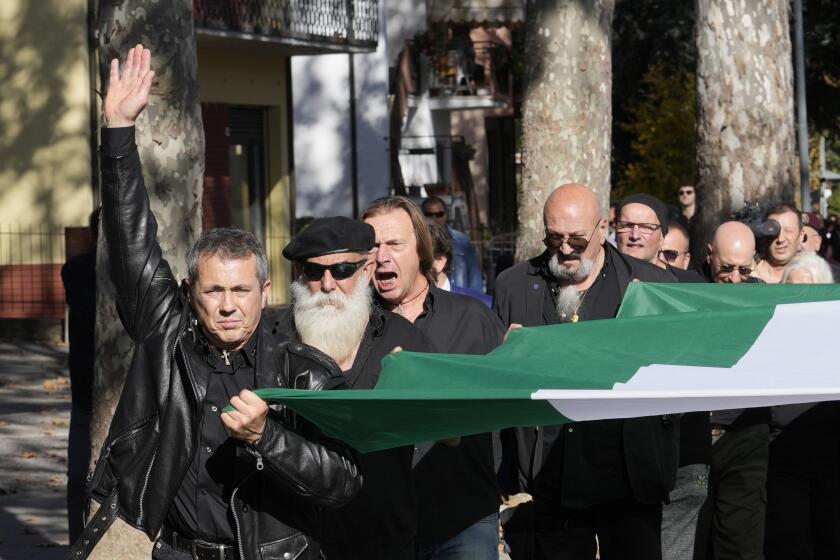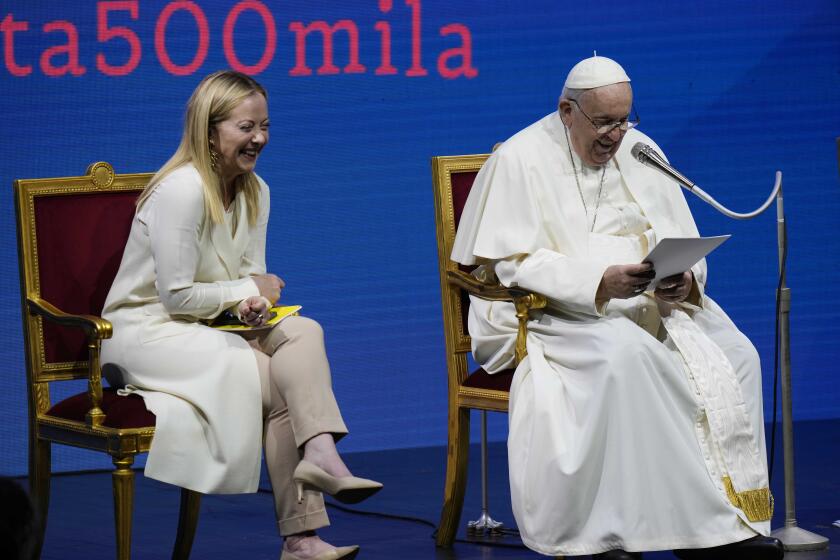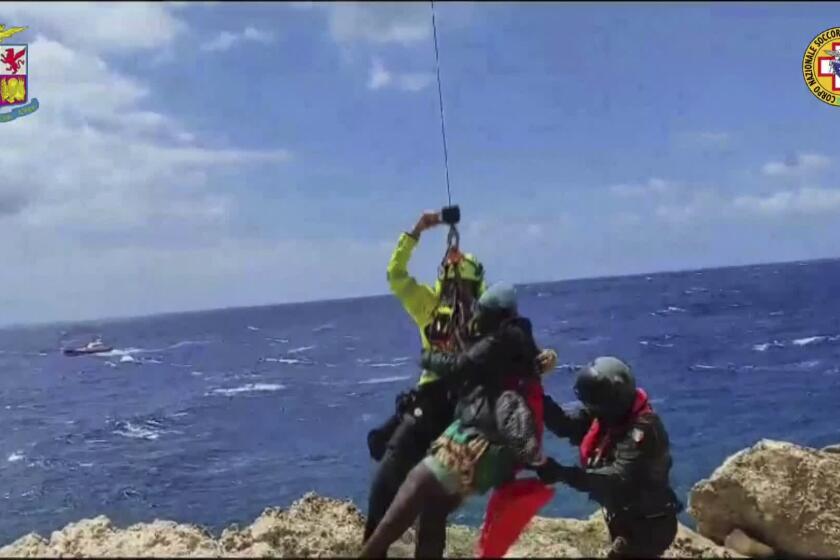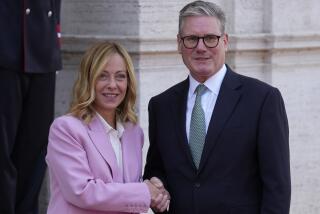Italy’s leader dials down the divisive rhetoric — but not her far-right agenda
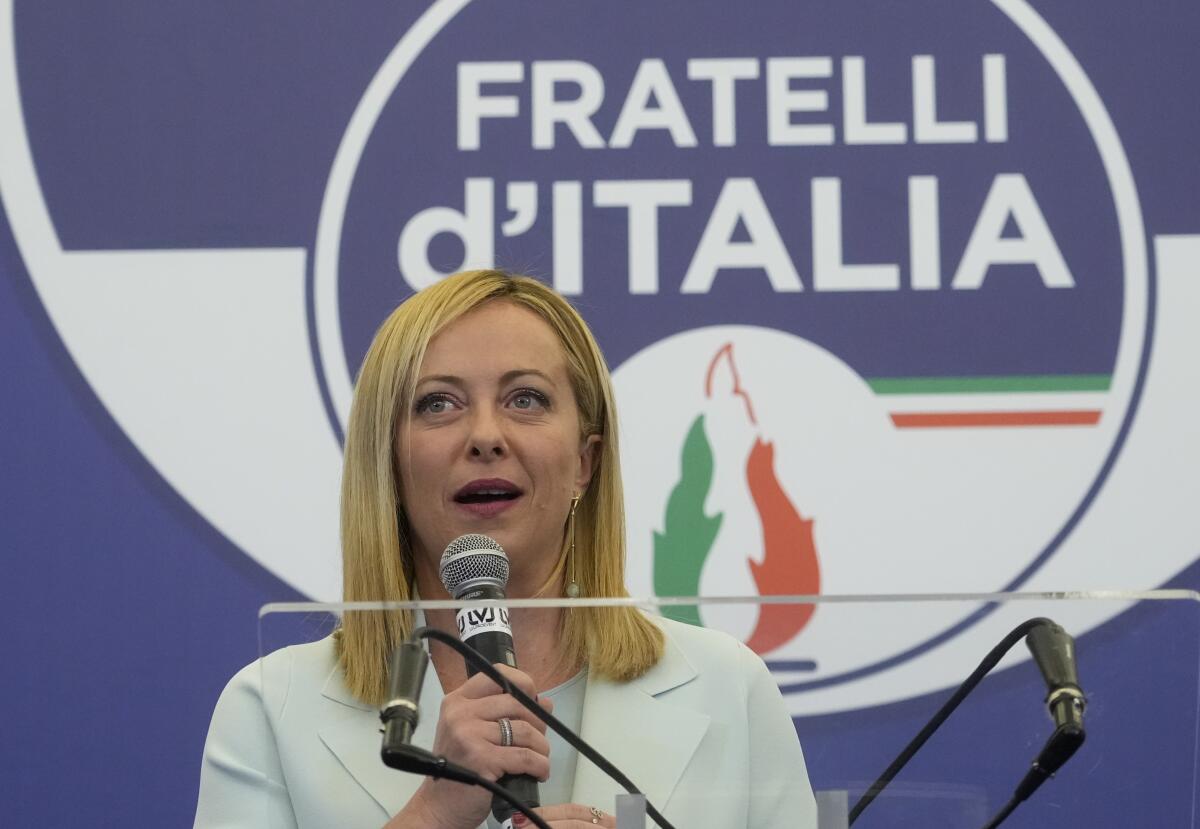
- Share via
ROME — When Giorgia Meloni was running to become Italy’s first far-right head of government of the postwar era, she steeped her winning campaign in the sharply ideological rhetoric of national sovereignty, “traditional families” and fear of migrants.
Since taking office as prime minister in September, Meloni has toned down the bombast reflected in the slogans she shouted last year at a rally in Spain for a far-right ally, such as “Yes to natural families! No to LGBT lobbies!”
But her government and her party’s lawmakers are still pursuing many far-right policies, including refusing to allow the names of some same-sex parents to be on their children’s birth records, broadening restrictions on surrogate pregnancies and even seeking to ban foreign words from government documents.
Her administration’s fervor now finds expression in policies promoted by ministries and in legislation pushed by lawmakers from her Brothers of Italy party, the political group with neofascist roots that she co-founded a decade ago.
Meanwhile, Meloni — while claiming to avoid the ideological fray — has downplayed the country’s fascist history, as she did earlier this month during a bitter feud over the role of neofascist militants in Italy’s deadliest-ever terrorist attack — the 1980 bombing of Bologna’s train station.
The names of the 85 dead are enshrined on a plaque in the station that calls them victims of “fascist terrorism.” In a commemorative speech, Italian President Sergio Mattarella noted that the attack’s “neofascist matrix” had been established by trial convictions.
But to the anger of Italy’s left, Meloni’s anniversary statement omitted any mention of the neofascist origins behind the bombing. Opposition leaders pointed out that while she was a lawmaker and not yet prime minister, Meloni pushed for efforts to determine the masterminds of the attack, seemingly raising questions about the judicial verdicts.
A century after Benito Mussolini’s 1922 March on Rome brought the fascist dictator to power, the Brothers of Italy party won the most votes in Italy’s national election Sunday. Experts cite voter disillusionment rather than ideology.
A few days after the anniversary, the communications director for the Rome area’s right-wing governor, who won election with Meloni’s support, cast more doubt on whether the bombing was the work of convicted neofascist terrorists.
Lazio Gov. Francesco Rocca told reporters that Meloni “wasn’t happy” about the revisionist comments made by his communications aide, who has a record of showing sympathy for far-right extremists. But the prime minister avoided making any public comment, and the aide kept his job.
During the campaign, Meloni kept her distance from Benito Mussolini’s fascist dictatorship, declaring that “the Italian right has handed fascism over to history for decades now.”
But she proudly defends a potent party symbol: a flame in the red, white and green colors of the Italian flag. The flame has its roots in the neofascist Italian Social Movement, which was founded by Mussolini admirers right after World War II. Brothers of Italy embedded the symbol into its own emblem.
Giorgia Meloni, who once praised Mussolini, will be Italy’s first female prime minister. Her Brothers of Italy party will face limits to implementing its far-right ideology.
Amid the bombing anniversary furor, a front-page cartoon in the Corriere della Sera newspaper depicted an alarmed-looking Meloni as the tricolor flame threatened to scorch her.
But the prime minister appears politically unscathed by ideological disputes. Opinion surveys indicate that Brothers of Italy is the most popular party among eligible voters, with polls showing that it has close to 30% support. That’s 4 percentage points higher than what the group garnered in the 2022 election.
Appearing to stay above the fray is part of Meloni’s strategy and style, said Columbia University political theory professor Nadia Urbinati. In contrast to her right-wing coalition partner, League party leader Matteo Salvini, who daily churns out photos of himself on social media, Meloni “is not everywhere. She doesn’t want to have this kind of populist aura,” Urbinati said in a telephone interview. “But she wants to shape the state according to her ideology.”
Fascist sympathizers sang in praise of Benito Mussolini as they marched to the slain Italian dictator’s crypt, 100 years after Mussolini rose to power.
Urbinati noted that one of the first moves by Meloni’s government was a crackdown on rave parties and similar gatherings, “based on what they define as anarchy.”
Building on Meloni’s campaign pledge to defend what she called traditional families, her government moved to limit recognition of parental rights to only the biological parent in families with same-sex parents.
Local offices of the Interior Ministry ordered city halls to stop automatically recording both parents when same-sex couples have children. That left non-biological parents unable to carry out everyday family tasks such as picking up children from school or dealing with pediatricians without written permission from their partners.
Last month, Parliament’s lower chamber also approved widening restrictions on surrogate pregnancy. The bill essentially reintroduced legislation that Meloni, in the previous legislature, had unsuccessfully proposed while an opposition lawmaker.
Pope Francis joined Italy’s conservative prime minister in encouraging Italians to have more kids after Italy registered a record low birthrate last year.
Under the bill now working its way through Parliament, it would be a crime for any Italian — in same-sex or heterosexual relationships — to use surrogate maternity abroad. For years, it has been a crime in Italy, and so far never prosecuted.
Raising Italy’s birthrate, one of the world’s lowest, is a key Meloni political plan. Her minister of agriculture, Francesco Lollobrigida, who is also her brother-in-law, inflamed political debate last spring when he warned in a speech against “ethnic substitution” by migrants.
“Italians are having fewer children — and the reasoning goes, let’s substitute them with someone else,” Lollobrigida said, dismissing any idea that immigrants would be a way to boost the population.
The government plans to spend millions of euros in European Union money to build more day-care centers to ease burdens on working parents, but that goal has fallen behind schedule.
Three boats launched by smugglers from northern Africa were shipwrecked in the Mediterranean. Some migrants spent two nights clinging to a rocky reef.
Also awaiting action in Parliament is proposed legislation to ban the use of foreign words in government documents and forbid state universities to offer English-only courses. If the bill in “defense of identity” passes, violators would risk fines as high as $110,000.
It is an idea reminiscent of Mussolini, whose first moves in power included purging the Italian language of foreign words, even on restaurant menus, and establishing stiff fines for violations. Critics of the proposed ban quickly pointed out that passage would erase part of a title held by a Brothers of Italy senator. Sen. Adolfo Urso, who serves in Meloni’s Cabinet, is minister of enterprises and “made in Italy” — in other words, Italian products. The last three words of the official title are in English.
More to Read
Sign up for Essential California
The most important California stories and recommendations in your inbox every morning.
You may occasionally receive promotional content from the Los Angeles Times.
